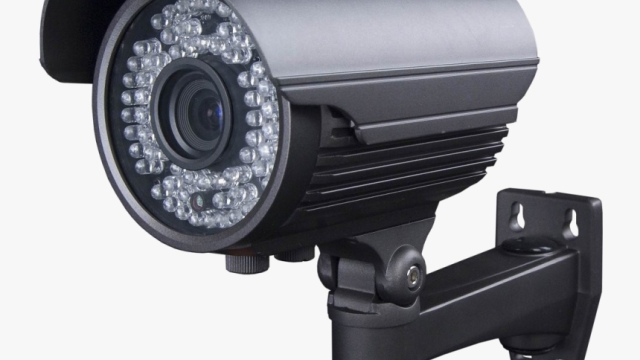
The Eyes That Never Sleep: Unveiling the Secret Powers of Security Cameras

In today’s fast-paced world, ensuring the safety and security of our surroundings has become paramount. Among the many tools at our disposal, security cameras stand tall as the silent sentinels, constantly monitoring and guarding our spaces. These unassuming devices possess an exceptional ability to capture events that unfold in their field of view, leaving no stone unturned. From the bustling city streets to the quiet corners of our homes, security cameras are the vigilant eyes that never sleep.
With their unwavering gaze, security cameras provide a valuable layer of protection, deterring potential wrongdoers and maintaining order within their purview. These watchful guardians are strategically positioned to provide widespread coverage, ensuring that no area remains concealed from scrutiny. By their mere presence, they instill a sense of caution, discouraging individuals from engaging in unlawful activities. Acting as a deterrent is just the beginning though, as the true power of security cameras lies in their remarkable ability to record and document incidents as they unfold.
The Evolution of Security Cameras
In the early days, security cameras were bulky and limited in their capabilities. They were often used in large public spaces such as banks and government buildings, where their presence alone was enough to deter potential criminals. However, these early cameras lacked the advanced technology that we are accustomed to today.
As time went on, security cameras began to shrink in size while simultaneously improving in quality. With the advent of digital technology, cameras were able to capture clearer and more detailed images, making it easier to identify individuals and incidents. This shift greatly enhanced the effectiveness of surveillance systems, leading to their widespread adoption in various settings.
Moreover, advancements in connectivity allowed security cameras to be linked to centralized monitoring systems, enabling real-time monitoring and rapid response. This innovation significantly increased the overall security levels in many areas, as suspicious activity could be identified and addressed promptly.
In recent years, the integration of artificial intelligence (AI) has revolutionized security camera capabilities. AI-powered cameras are now equipped with sophisticated features such as facial recognition, object detection, and behavior analysis. These intelligent systems can automatically identify potential threats, alerting security personnel or activating other security measures if necessary.
The evolution of security cameras has come a long way, transforming them from simple devices to powerful tools in the fight against crime and ensuring public safety. As technology continues to advance, it is exciting to imagine what the future holds for security cameras and the role they will play in our lives.
2. How Security Cameras Enhance Safety
Security cameras play a crucial role in enhancing safety in numerous settings. Whether in public spaces, residential areas, or commercial establishments, these vigilant eyes contribute significantly to maintaining a secure environment for everyone.
Firstly, security cameras act as a deterrent to potential criminal activity. The mere presence of these surveillance devices serves as a strong warning to potential wrongdoers that their actions are being monitored. Knowing that their behavior is being recorded creates a psychological barrier, discouraging individuals from engaging in illegal or harmful activities.
Secondly, security cameras enable prompt response to emergencies. With real-time monitoring capabilities, these cameras allow security personnel or law enforcement to immediately intervene in situations that require immediate attention. By providing live footage of incidents as they unfold, security cameras help authorities make quick and accurate decisions, effectively minimizing potential risks and threats.
Lastly, security cameras assist in collecting crucial evidence for investigations. In cases of criminal activities, accidents, or disputes, the recorded footage captured by these cameras can serve as invaluable evidence. The high-quality video recordings can help identify culprits, establish timelines, and provide essential details that aid law enforcement agencies and legal proceedings.
The power of security cameras lies in their ability to deter criminals, enable swift responses, and provide vital evidence. As technology advances, these cameras continue to evolve, incorporating features like facial recognition and advanced analytics. With these advancements, security cameras are becoming even more effective tools in enhancing safety and protecting our communities.
3. Overcoming Challenges with Security Cameras
In order to maximize the effectiveness of security cameras, certain challenges have to be addressed. Here are some common obstacles faced and how they can be overcome:
Limited Field of View:
One challenge security cameras often encounter is their limited field of view. To ensure comprehensive coverage, it is crucial to strategically position multiple cameras in key areas. By installing cameras at different angles and heights, blind spots can be minimized, providing a wider surveillance scope.Lighting Conditions:
Another challenge is dealing with varying lighting conditions that can impact camera performance. To overcome this, modern security cameras are equipped with advanced features such as infrared sensors and wide dynamic range (WDR) imaging. These technologies enhance visibility in low light or high contrast situations, ensuring clearer video footage.Signal Interference:
Signal interference can disrupt video transmission and affect the reliability of security cameras. To mitigate this, wireless cameras can use dual-band Wi-Fi or employ wired connections for a more stable signal. Additionally, utilizing frequency-hopping spread spectrum (FHSS) or secure protocols like WPA2 encryption can minimize the risk of external interference.
Security Camera Repairs
By addressing these challenges, security cameras are able to provide a robust and dependable surveillance solution. From enhancing field of view to overcoming lighting limitations and signal interference, these innovative technologies have significantly improved the capabilities of modern security systems.



